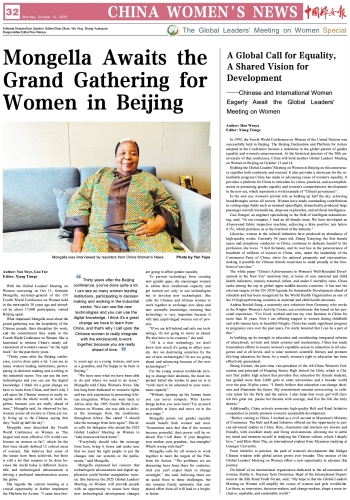Author: Hou Wenya
Editor: Xiang Tiange
In 1995, the Fourth World Conference on Women of the United Nations was successfully held in Beijing. The Beijing Declaration and Platform for Action adopted at the Conference became a milestone in the global pursuit of gender equality and women's empowerment. At the historical juncture of the 30th anniversary of that conference, China will hold another Global Leaders' Meeting on Women in Beijing on October 13 and 14.
Holding the Global Leaders' Meeting on Women in Beijing on this anniversary signifies both continuity and renewal. It also provides a showcase for the remarkable progress China has made in advancing cause of women's equality. It provides a platform for China to articulate its vision, practices, and accomplishments in promoting gender equality and women's comprehensive development in the new era, which represents a vivid example of “China's governance”.
In the new era, women's pivotal role as holding up half the sky, achieving breakthroughs across all sectors. Women have made outstanding contributions in cuttingedge fields such as manned spaceflight, domestically produced large passenger aircraft, biomedicine, deepsea exploration, and artificial intelligence.
Guo Dongni, an engineer specializing in the field of intelligent manufacturing, said, “In our company, I lead an allfemale team. We have developed an AIpowered fabric inspection machine, achieving a false positive rate below 0.1%, which positions us at the forefront of the industry.”
Likewise, women in the cultural industries have produced an abundance of highquality works. Currently 96 years old, Zheng Xiaoying, the first female opera and symphony conductor in China, continues to dedicate herself to the profession she loves. “I feel fortunate, and its root lies in the perseverance of hundreds of millions of women in China, who, under the leadership of the Communist Party of China, strive for national prosperity and rejuvenation, making it possible for Chinese female musicians to stand proudly at the forefront of our time.”
The white paper “China's Achievements in Women's WellRounded Development in the New Era” mentions that, in terms of core maternal and child health indicators, namely maternal, infant, and under5 mortality rates, China ranks among the top in global uppermiddleincome countries. It has met the relevant targets of the UN 2030 Agenda for Sustainable Development ahead of schedule and has been recognized by the World Health Organization as one of the 10 highperforming countries in maternal and child health outcomes.
Andrea SteckelJiang, a maternity care volunteer from Germany, who works at the Ningbo Women's Activity Center, can corroborate this based on her personal experience. “I've lived, worked and run my own business in China for more than 20 years. Now I am offering support to women during childbirth and with trauma here in beautiful Ningbo. China has made significant progress in pregnancy care over the past years, I'm really honored that I can be a part of this.”
In building up its strength in education and coordinating integrated reforms of educational, scitech and talent systems and mechanisms, China has made tremendous efforts to ensure women's equitable access to education in all categories and at all levels, and to raise women's scientific literacy and promote lifelong education for them. As a result, women's right to education has been effectively guaranteed.
Zhang Guimei, the parttime vicepresident of the AllChina Women's Federation and principal of Huaping Senior High School for Girls, which is China's first public high school that provides free education for female students, has guided more than 2,000 girls to enter universities and a broader world over the past 10plus years. “I firmly believe that education can change destinies and illuminate the future. My commitment remains unwavering: to cultivate talent for the Party and the nation. I also hope that every girl will cherish this great era, pursue her dreams with courage, and live the life she truly desires.”
Additionally, China actively promotes highquality Belt and Road Initiative cooperation to jointly promote women's sustainable development.
“Before coming to China, I worked as a civil servant at Myanmar's Ministry of Commerce. The Belt and Road Initiative offered me the opportunity to pursue advanced studies in China. Here, classmates and teachers are sincere and friendly, with excellent study and living environments, allowing me to settle my mind and immerse myself in studying the Chinese culture, which I deeply love,” said Khin Hnin Thu, an international student from Myanmar studying at Guangxi University.
From initiative to practice, the path of women's development that bridges Chinese wisdom with global action grows ever broader. This session of the Global Leaders' Meeting on Women offers a new opportunity to advance this journey.
On behalf of an international organization dedicated to the advancement of women, Dahlia A. Ducreay from Dominica, Head of the International Department at the Silk Road Youth Forum, said, “My hope is that the Global Leader's Meeting on Women will amplify the voices of women and girls worldwide. Let them, as innovators, decisionmakers, and changemakers, shape a more inclusive, equitable, and sustainable world.”
